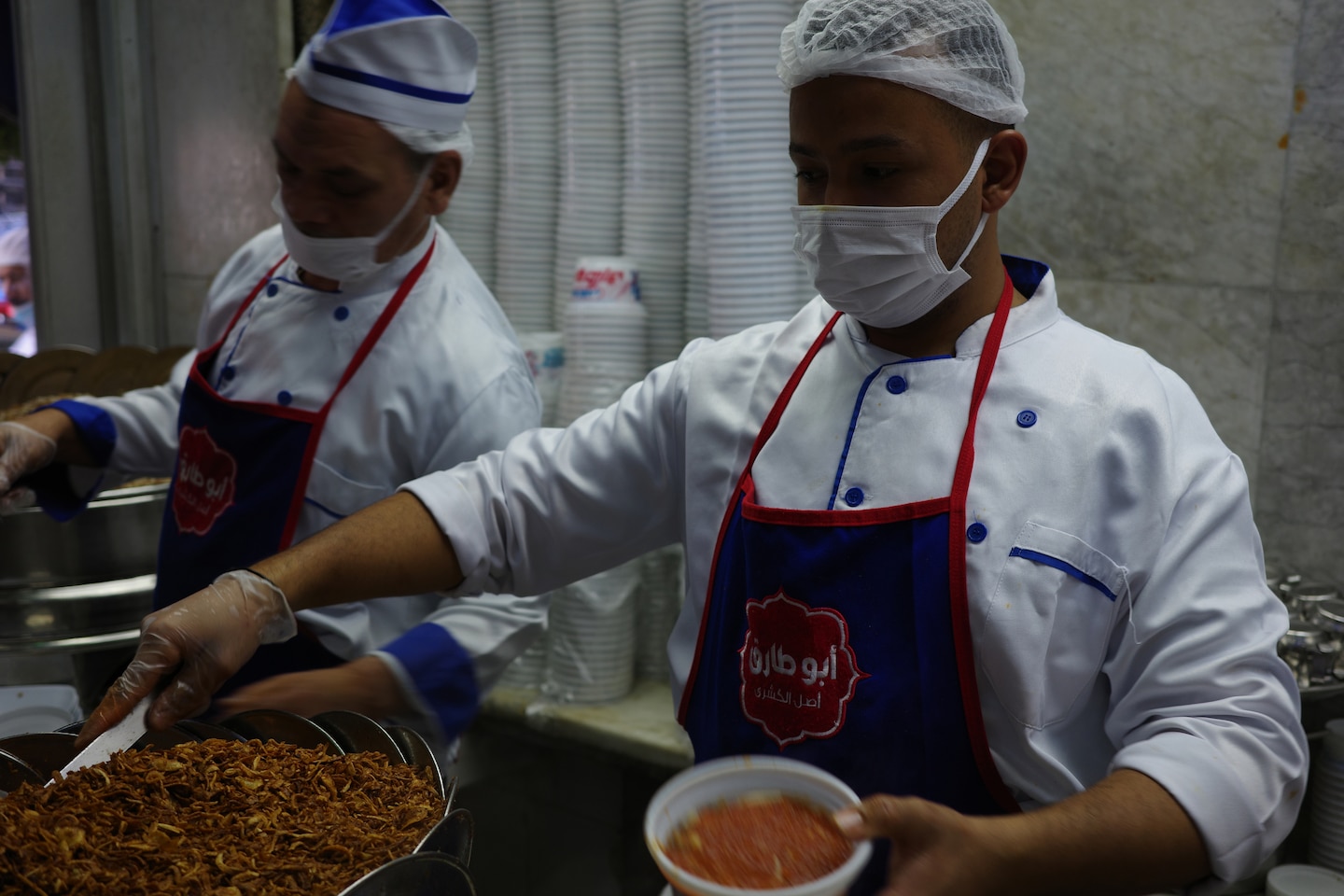But with food prices rising rapidly in the face of a growing economic crisis, even the most low-cost meals are becoming more expensive to make — hitting the margins of koshary kingpins like Youssef Zaki, the owner of Abou Tarek, as well as the pockets of regular Egyptians.
Just when Egypt hoped to recover from the pandemic, which saw its massive tourism sector essentially grind to a halt, Russia invaded Ukraine. The war set off a series of unexpected repercussions across the region, hitting Egypt particularly hard.
Foreign investors withdrew billions of dollars from the country within weeks of the invasion, unsettling the economy. Egypt also imports more wheat than any other country — most of it from Russia and Ukraine. The cost of wheat and oil began to soar while tourism numbers dropped again due to a longtime reliance on Russian and Ukrainian visitors.
Egypt is now facing one of its worst periods of inflation in years, and regular Egyptians are largely paying for it.
Food and drink prices have increased by 30.9 percent since this time last year. Earlier this year, the official exchange rate was once 15.6 to the dollar. Now it sits at 24.7. On the black market, one dollar can be sold for as many as 33 pounds. Banks are limiting the withdrawal of dollars to try to keep cash in the country. Many Egyptians are forgoing indulgences — from avoiding dining out to postponing weddings — hoping costs might soon go down.
Luckily for Zaki, koshary remains a major staple in the Egyptian diet.
To avoid raising prices Zaki knows his customers can’t afford, Abou Tarek has made its portions slightly smaller. Even so, their customer base has somewhat dwindled. With dozens of employees between the kitchen, waitstaff and delivery teams, Zaki now has the same number of workers to pay as before — just less money to do it.
The same customers who once bought “a big plate of koshary, they might buy a smaller one,” Zaki said, sitting on a plastic chair on the street outside, as passing fans gave him the celebrity treatment, interrupting the interview to take photos with him.
“Instead of eating three meals, people might eat just one or two,” he said.
To blame the crisis solely on the war in Ukraine would be “barely true,” said Egyptian political economist Wael Gamal. Years of borrowing and investment in megaprojects made Egypt especially vulnerable, he said. Those projects have been championed by President Abdel Fatah El-Sisi, who took power in a military coup in 2013 and has made infrastructure development a hallmark of his presidency.
In December, after months of negotiations, Egypt announced it would receive a $3 billion loan from the International Monetary Fund — including $347 million that will be disbursed immediately. It is the fourth time the IMF has assisted Egypt in the last six years.
Egypt’s economic troubles, Gamal said, become “deeper every time they go to the IMF and take more loans and cover older loans with new loans.”
Zaki’s restaurant, successful since the ’90s — and featured once on Anthony Bourdain’s “No Reservations” — has given him enough cushion to weather the storm. Having sold koshary for most of his life, first from his father’s food cart and later from his own restaurant, Zaki has watched prices go up and come down over time. “But never like this,” he said.
In the upper-class neighborhood of Zamalek, an island on the Nile, Ahmed Ramadan, 27, serves around 700 orders of koshary and other takeaway meals each day. Most of his customers are students and working-class employees who commute there each day.
Compared to others in his low-income neighborhood of Imbaba, Ramadan considers himself lucky. He has steady work, and can walk to the koshary restaurant in Zamalek each day without worrying about rising transport costs. For his neighbors, “the situation has gotten worse and worse,” he said. “They have to make ends meet and eat just vegetables and rice. What can they do?”
Supply costs have gone up so much that a few weeks ago his restaurant stopped serving its cheapest portion of koshary — covering up the option on their menu with a piece of tape. Until recently, Ramadan said, he could buy a ton of rice for around 8,000 Egyptian pounds. Now, he said, it costs 18,000 pounds. The cost of his pasta supply has jumped by 6,000 pounds. Even the plastic containers and bags they use to package the meals are pricier than before.
But customers are still showing up. “People have to eat,” he said.
Nearby, in the neighborhood of Agouza, Medhat Mohamed, 47, stood behind the counter of a roadside restaurant that sells taameya (Egyptian falafel) and fuul (stewed bean) sandwiches. Both are vegetarian staples in the Egyptian diet, but customers are starting to make do without, Mohamed and his co-workers said.
A year ago, the sandwiches sold for three and a half pounds. Now they cost four and a half.
“The war in Ukraine caused the prices of flour and oil to increase,” Mohamed said. “When that increased, everything else increased.”
Now, some poorer customers buy pieces of falafel rather than a sandwich, putting it in bread they get through a subsidy program, just to save a few pounds.
Even if the restaurant doubled its prices, the shop’s manager, Sayyid el-Amir, said, “we wouldn’t be making much of a profit.”
A lot of other shops are closing, he said, but he would do everything he could to avoid layoffs. “Any of these workers has three to four children,” he said, pointing at Mohamed and the other men, including one tossing raw falafel into a bubbling pan of oil. All the restaurant’s employees also have other jobs, making deliveries or working in other restaurants.
“It’s a wonder how people survive,” he said.



